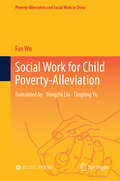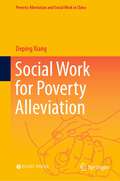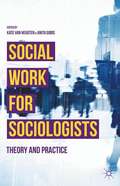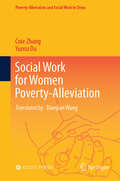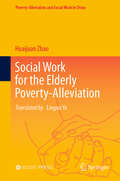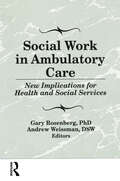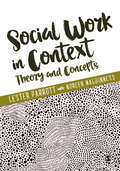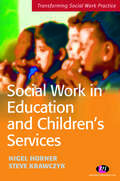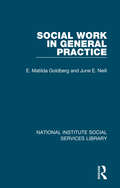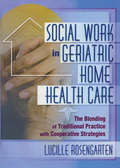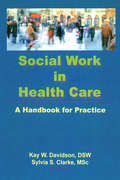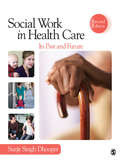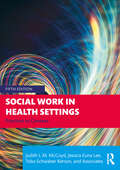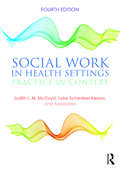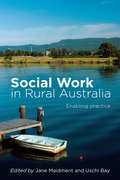- Table View
- List View
Social Work for Child Poverty-Alleviation (Poverty-Alleviation and Social Work in China)
by Fan Wu Xiaoyan Huang Feibei Zheng Jinghong Liu Cong FuThis book is to reflect on the achievements and challenges of current poverty-alleviation practices for children in China, in order to understand and clarify the function, intervention strategies and development direction of social work in child poverty-alleviation. It systematically presents the theoretical framework and practical path of social work in child poverty-alleviation. The book has three main focuses: firstly, it reviews the theoretical analysis framework of social work in child poverty-alleviation, such as social development perspective, social integration perspective and ecological systems theory at a macro-level, as well as life course theory and resilience theory at a micro-level; secondly, it presents the general practice path of social work in child poverty-alleviation from the perspective of practice framework, intervention path, work procedures and specific methods, exploring the key points, difficulties, methods and techniques of social work intervention in child poverty-alleviation practices through local cases in China; thirdly, based on the international social work experience in child poverty-alleviation and combined with local practices in China, it clarifies the future direction and advantages of social work in child poverty-alleviation in China.
Social Work for Poverty Alleviation (Poverty-Alleviation and Social Work in China)
by Deping XiangThis book studies poverty issues by using social work theories and methods. It illustrates the values, theories, elements, contents, and processes of anti-poverty social work, summarizes the development of China’s anti-poverty policies, and explores the models and methods of anti-poverty social work in China. This book represents the research results of the National Social Science Foundation Project “Research on Dynamic Monitoring and Effectiveness Evaluation of the Implementation of Targeted Poverty Alleviation Strategy” (16ZDA022) and China’s Ministry of Education’s Philosophy and Social Science Development Construction (Incubation) Project Report “Anti-Poverty Development Report in China” (11JBGP038).
Social Work for Sociologists: Theory and Practice
by Kate Van Heugten Anita GibbsIn Social Work for Sociologists, a team of international authors with backgrounds in social work and sociology explain and illustrate how "the social work imagination" links theory and practice to interventions and outcomes. Van Heugten, Gibbs, and contributors address lingering disciplinary divisions and controversies about the appropriateness of engaging with public issues and social justice concerns, and introduce key values, ethics, and practice frameworks. Finally, they illustrate theutility of social work practice frameworks in fields including child welfare, group work, bicultural and multicultural practice, community work, workplace mobbing, and research.
Social Work for Women Poverty-Alleviation (Poverty-Alleviation and Social Work in China)
by Cuie Zhang Yunsu DuThis book comprehensively applies social gender theory, life course theory, and spatiotemporal sociology theory to explore social work actions for poverty alleviation among women based on empirical investigations and social work practice. Taking impoverished women as the research object, this book analyzes the characteristics and difficulties of women's poverty and poverty alleviation from the vertical dimension of life course as well as from the horizontal dimension of social space Meanwhile, taking impoverished women as the service object, it systematically sorts out the main modes of social work for women’s poverty alleviation, presents classified cases of social work for poverty reduction targeting rural women in different life stages, and summarizes the main problems in the practice of social work for poverty alleviation.
Social Work for the Elderly Poverty-Alleviation (Poverty-Alleviation and Social Work in China)
by Huaijuan ZhaoThis book focuses on how to provide social work services for elderly people living in poverty. Divided into eight chapters, the book first outlines the scale, characteristics, and causes of poverty among elderly people and discusses the significance of social work in poverty alleviation for the elderly. The book then concentrates on different types of elderly people, such as those in economic and ecological poverty, and those suffering from poverty caused by illness, disability, and lack of ability, analyzing the content and service modes and providing case studies. Finally, the book discusses ways and strategies for social work participation in poverty alleviation for the elderly in the post-poverty alleviation era. This book combines theory with practice and is a useful reference for government departments, universities, as well as social organizations related to social work.
Social Work in Ambulatory Care: New Implications for Health and Social Services
by Gary RosenbergThe contributing authors of this volume--respected authorities on health care and social work--describe the shift from hospital based care to ambulatory patient and family focused community based services. Social Work in Ambulatory Care assists readers who need to develop, plan, and implement new social work roles for a changing health care system. Chapters focus on the implications of health care reform, based on policy or economic mandates, and provide specific examples of how social service providers can approach health care in a new era.As the authors describe the shift in health care to ambulatory care and the role of social work in this new environment, they cover areas of potential concern to social service providers. Readers will be challenged to plan new social work roles in the future--roles that help advance social work’s own definitions of health and wellness. Specific examples of creative roles for social work are described and several of the most important areas this guidebook analyzes are: the health care system under siege support groups managed care emergency room community based careFor social workers in health settings, struggling with the questions of relevance, growth, and worth in a changing environment, Social Work in Ambulatory Care provokes new ideas about health care for the future.
Social Work in Context: Theory and Concepts
by Lester Parrott Noreen MaguinnessThis book examines key sociological theories that have contributed to the understanding of the nature of social work, its organisation and delivery. It provides key sociological concepts and theories to help student social workers better understand the nature of their work and the social and political context within which they will be working. Taking a practical approach to social work, and focusing on the application of theory, the book also provides insightful discussions to important thinkers such as Douglas, Beck and Furedi, and how their ideas have direct relevance for understanding the risk averse nature of social work.
Social Work in Context: Theory and Concepts
by Mr Lester Parrott Noreen MaguinnessThis book examines key sociological theories that have contributed to the understanding of the nature of social work, its organisation and delivery. It provides key sociological concepts and theories to help student social workers better understand the nature of their work and the social and political context within which they will be working. Taking a practical approach to social work, and focusing on the application of theory, the book also provides insightful discussions to important thinkers such as Douglas, Beck and Furedi, and how their ideas have direct relevance for understanding the risk averse nature of social work.
Social Work in East Asia
by Christian AspalterOwing to rapid economic development and the onset of population ageing, social work has become a major means of delivering social services and relieving and preventing social problems at an individual, family, and community level in East Asia. In addition to this, the number of activities undertaken by social welfare NGOs has risen a great deal throughout East Asia, resulting in a greater demand for professional social workers. With governments across the region having discovered the beneficial effects of professional social work for both social integration and social harmony, there is now greater support for the development of this academic discipline and profession. This groundbreaking volume explores the current state of development of social work provision across the region. It is the first book of its kind to investigate current and future trends, as well as the challenges and pitfalls of social work - one of the fastest-growing professions in East Asia.
Social Work in Education and Children′s Services (Transforming Social Work Practice Series)
by Nigel Horner Steve KrawczykIn light of the profound changes confronting the Child Welfare landscape, social work practitioners are expected to understand both the current and anticipated inter-relationships between social work and education. A clear introduction to social work in an educational setting, this book supports students on the social work degree course and builds on the success of the Transforming Social Work Practice series, which is based on common learning principles.
Social Work in General Practice (National Institute Social Services Library)
by E. Matilda Goldberg June E. NeillIn the early 1970s general practitioners were well aware that they were being asked to deal not only with physical illness in their patients but also with the stresses relating to social and emotional problems. Increasingly often they were working together with health visitors and social workers in attempting to respond more effectively to these demands. Originally published in 1972, this study describes the attachment of a social worker to a group general medical practice in London, indicating why, for all social groups, the general practice is an appropriate point at which psychosocial problems may be identified and treated. The authors describe the nature and range of patients’ problems that come to light in the consulting room; how patients present their problems to the social worker; and the kind of help the social worker is able to offer. They explore the extent to which the general practice setting provides opportunities for preventive therapy and further describe how social work in general practice can most effectively be related to existing social services in the community, particularly to the reorganised personal social services. Their findings are supported throughout by illuminating case studies. The book also discusses the integration of the social worker into the general practice team, the problems that have to be solved and the mutual enlightenment that results. This emerges as an extremely encouraging and instructive experiment, which will immediately interest social service departments and social workers, doctors and nurses, both students and those in practice. The wide spectrum of social problems encountered and dealt with by the social worker in a general practice make it a particularly stimulating account.
Social Work in Geriatric Home Health Care: The Blending of Traditional Practice with Cooperative Strategies
by Lucille RosengartenExplore how community-based networks can effectively meet the needs and problems of sick, elderly people and their caregivers!Social Work in Geriatric Home Health Care: The Blending of Traditional Practice with Cooperative Strategies explores how social workers, aides, nurses, administrators, and policy makers can cooperatively work by maintaining appropriate health records in order to keep the elderly living at home. Based on the author’s twenty-five years of social work experience in geriatric home care case management, this book explores improved ways to organize home health care by use of cooperative strategies in order to assist older individuals in living independent lives at home. Complete with informative case studies and interviews, you will explore useful examples of geriatric social work practice through Concerned Home Managers for the Elderly, (COHME) a nonprofit, licensed home health care agency. Social Work in Geriatric Home Health Care examines many crucial geriatric care and case management issues of concern to geriatric social workers, including:offering meaningful and fulfilling work as a home health care aideproviding high-quality training and ongoing education for home care aidescreating a cooperative environment by encouraging staff, social workers, and nurses to share expertise with the case management coordinators who are responsible for placing the geriatric patient at home or in a special care facilityinvolving the client in the management of his or her own health carecreating concise, one-page reports for each home visit by using a “One-Sheet” to help you extract case assessments and plans for your geriatric client in a readily accessible formatdealing with state regulatory authorities and the general trend in home health care to place the elderly in nursing homespaying careful attention to financial and administrative problems within your organization while striving to remain true to your original mission of providing at-home careSocial Work in Geriatric Home Health Care will help you explore a different way of organizing home health care for the sick and elderly at a time when the percentage of people over sixty-five who will require care is rapidly increasing. This important book works to improve the case management of geriatric people and challenges home health care workers and legislators to become more progressive in their thinking about the direction in which geriatric health care should move at the turn of the century. With this vital book, you will gain insight into organized and cooperative methods of providing home health care for the elderly and find improved methods for managing your geriatric cases to give your clients optimum care.
Social Work in Health Care: A Handbook for Practice (Social Work In Health Care Ser. #Vol. 12, No. 3)
by Kay DavidsonHere is an outstanding reference book of major readings in the field of social work in health care. Practitioners, educators, researchers, and students can use this landmark two-part volume to review dominant themes and critical issues in today’s practice environment and to understand the evolution of current trends and emerging policies and programs. In this one desktop source book, hundreds of references relevant to the health care social work field are immediately accessible. Education, policy, practice, and research issues integral to social work’s expanding role in health care are the main focus, with each chapter highlighting a theme of enduring importance to the field. Other outstanding articles related to the chapter’s theme are cited in the appendix to each chapter which also includes a selected bibliography of suggested topical readings. Comprehensive new book filled with information vital to social workers in the health care field! Over 900 pages of scholarly articles by the foremost social work leaders in health care! 9 categories embrace the range of social work activity in the health care field! Exciting new ideas and practical suggestions for everyday dilemmas! Hundreds of references immediately accessible in one desktop source! Selected bibliography of topical headings provides sources for even more relevant articles! A MUST HAVE volume for instructors and students! Deepen your understanding of all aspects of social work practice in health care with this superb volume! Here is an outstanding reference book of major readings in the field of social work in health care. Practitioners, educators, researchers, and students can use this landmark two-part volume to review dominant themes and critical issues in today’s practice environment and to understand the evolution of current trends and emerging policies and programs. Social Work in Health Care makes hundreds of references relevant to the health care social work field immediately accessible in this one desktop source book. Education, policy, practice, and research issues integral to social work’s expanding role in health care are the main focus, with each chapter highlighting a theme of enduring importance to the field. Other outstanding articles related to the chapter’s theme are cited in the appendix to each chapter which also includes a selected bibliography of suggested topical readings. Find answers and ideas for everyday dilemmas in this all-inclusive, information-packed volume!Social workers practicing in the rapidly expanding health care field call upon a repertoire of skills to fulfill a variety of functions including direct patient care and contact with patients’families, education, and influencing organizational policies on their clients’behalf. The in-depth scholarship and the diversity of multiple approaches to health care social work, as presented in Social Work in Health Care, will have a strong impact on the field. Through the intertwining network of education, policy, practice, and research issues in the book, and professsional discussion of those topics, a beginning point exists from which social workers can develop principles to guide their social work activities in the medical and health fields.
Social Work in Health Care: Its Past and Future (2nd Edition)
by Surjit Singh DhooperSocial Work in Health Care: Its Past and Future gives social workers up-to-date, comprehensive information about the roles they can play and the skills they need in all aspects of health care. The book focuses on health care's four major domains: acute care, ambulatory care, illness prevention and health promotion, and long-term care. The author reviews the past and present of each of these fields, projects their major needs in the future, and suggests how social work can step in and help meet those needs. He presents practice theories, principles, approaches, models, and techniques appropriate for the many social work roles and responsibilities. The book concludes by describing general strategies social workers can use to succeed and thrive in health care settings.
Social Work in Health Emergencies: Global Perspectives
by Patricia FronekThis is the first comprehensive book that provides accessible, international knowledge for practitioners, students and academics about social work in health emergencies and spans fields of practice across world regions with particular reference to the COVID-19 pandemic. Divided into three sections: • Regional, Historical and Social Work Perspectives takes a journey through world regions during the first six months of the pandemic as it unfolded, explores the lessons found in the history of pandemics and situates public health social work practice in the values of the profession. Situating the diversity of challenges and opportunities in context, in turn, influences current and future social work practice. • Social Work Practice, Issues and Responses explores social work practice innovations and responses across eleven key practice fields. International authors feature social work responses during the COVID-19 health emergency from different regions of the world. • Preparing for the Future analyses broader concepts, innovations and the implications for future practices as social work enters a new era of service delivery. The 20 chapters explore the convergence of pandemic, politics and planet which is critiqued within a framework of the profession’s ethics and values of human dignity, human rights and social justice. Social work’s place in public health is firmly situated and built on the premise that the value social work brings to the table deserves recognition and should be documented to inform the development of the profession and future practice and how social work must carry lessons forward to prepare for the next pandemic. The book is relevant to a wide range of audiences, including practitioners, educators and students in social work, human services, international development and public health, as well as policy makers and researchers.
Social Work in Health Settings
by Judith L.M. McCoyd Toba Schwaber KersonThe most comprehensive book of its kind, Social Work in Health Settings presents a "practice in context" framework which is then applied in thirty-one casebook chapters, covering a great variety of health care settings from working with survivors of domestic violence through supporting people with HIV to services for military personnel. Reflecting the enormous changes in policy, health care delivery, insurance systems, and the diagnosis and treatment of many conditions, this third edition features all new case chapters. Each chapter considers the impact of dimensions of context including policy, technology and organization on the client situation and then explores the key practice decisions that structure the helping relationship: the definition of the client; determining goals, objectives and contract; meeting place; use of time; strategies and interventions; stance of the social worker; use of resources outside of the social worker/client relationship; reassessment and evaluation; and transfer or termination. This thought-provoking volume thoroughly integrates social work theory and practice, and provides an excellent opportunity for understanding particular techniques and interventions. In this era of managed care, downsizing, and moving away from hospital-based work, the approach taken in Social Work in Health Settings proves more salient than ever before.
Social Work in Health Settings: Practice in Context
by Toba Schwaber Kerson Judith L.M. McCoyd Jessica Euna LeeThis fully revised and expanded fifth edition of Social Work in Health Settings: Practice in Context maintains its use of the Practice-in-Context (PiC) decision-making framework to explore a wide range of social work services in healthcare settings. The PiC is updated in this edition to attend to social determinants of health and structural conditions. The PiC framework is applied in over 30 case chapters to reflect varied health and social care settings with multiple populations. Fully updated to reflect the landscape of healthcare provision in the US since the Affordable Care Act was reaffirmed in 2020, the cases are grounded by "primer" chapters to illustrate the necessary decisional and foundational skills for best practices in social work in health settings. The cases cover micro through macro level work with individuals, families, groups, and communities across the life course. The PiC framework helps maintain focus on each of the practice decisions a social worker must make when working with a variety of clients (including military veterans, refugees, LGBTQ+ clients). The ideal textbook for social work in healthcare and clinical social work classes, this thought-provoking volume thoroughly integrates social work theory and practice and provides an excellent opportunity for understanding particular techniques and interventions.
Social Work in Health Settings: Practice in Context
by Judith L.M. McCoyd Toba Schwaber KersonSocial Work in Health Settings: Practice in Context maintains its use of the Practice in Context (PiC) decision-making framework to explore a wide range of social work services in health care settings. The PIC framework is used to cover a broad range of social work practice sites, settings and populations over 30 case chapters. Fully updated to reflect the landscape of health care provision in the US since the Affordable Care Act was passed, the cases are grounded by 'primer' chapters to illustrate the necessary decisional and foundational skills for best practices in social work in health settings. The cases cover working with both individuals and groups of clients across the life course and the PiC framework helps maintain focus on each of the practice decisions a social worker must make when working with a variety of clients from military veterans to HIV positive children. The ideal textbook for social work in health care and clinical social work classes, this thought-provoking volume thoroughly integrates social work theory and practice, and provides an excellent opportunity for understanding particular techniques and interventions.
Social Work in Higher Education: Demise or Development? (Routledge Revivals)
by Karen LyonsFirst published in 1999, in the light of recent moves towards deprofessionalisation and instrumentalism, Karen Lyons has conducted extensive research into the challenges facing social work training as a higher education discipline. Here, these challenges are located in a discussion of wider changes in both higher education and the personal social services, and are also linked to debates about professional education and the nature of knowledge. The analysis is based on original data and includes reference to pedagogical and cultural factors, and to internal and external policies which might make social work viable or vulnerable in the higher education context. This multi-disciplinary perspective reflects a characteristic of social work study itself - a quality which might be seen as either problematic or as a strength. The book concludes that, while the future scale and form of the social work subject area lie partly outside the control of social work educators, they have a key role to play in the development of the discipline. This includes the promotion of research, which should underpin the creation of knowledge and inform professional practice in the changing field of personal social services.
Social Work in Post-War and Political Conflict Areas: Examples from Iraqi-Kurdistan and beyond
by Cinur Ghaderi Kristin SonnenbergThe book offers unique access to theoretical approaches and practical examples of international social work in the context of war and conflicts. The reader gains knowledge about the competences and role of social work, which contributes to mitigating the effects of war and conflict. The book raises the question of how to connect international social work with local approaches and offers suggestions for a development of social work with respect to exchanging knowledge and experiences between the West and the East, the Global North and the Global South. It furthermore discusses the role of social work in reducing the problem of gender-based violence and in the methods of peacebuilding processes in post-war and post-conflict societies.
Social Work in Rural Australia: Enabling practice
by Jane Maidment Uschi BaySocial work practice in a country town or small remote community several hours' drive from the nearest centre is very different from practice in the city. Social Work in Rural Australia offers an introduction to the challenges and rewards of professional practice in rural and remote areas.The authors explore the practical implications for social workers in non-urban regions, including teamwork with professionals from other fields, working with various sub-groups in communities and across distance with other social work colleagues, the diversity of rural livelihoods and lifestyles, and increasingly pressing environmental issues. Social work theories and case studies demonstrate how enabling practice can promote clients' and communities' ability to deal with some of the challenges of housing, youth unemployment, child protection, ageing, mental health, disability and the obstacles faced by Indigenous, migrant and refugee populations, in specific geographical settings.Social Work in Rural Australia encourages students and practitioners towards a holistic and contextual engagement with rural communities in current and newly developing fields of social work practice.'This accessible text integrates the theory and practice of social work in often overlooked rural and remote regions. The case studies offer students and practitioners practical insights and celebrate rural practice as both unique and enriching.' - Alana Johnson, 2010 Victorian Winner RIRDC Rural Women's Award, Family Therapist and Social Worker
Social Work in Schools: Principles and Practice
by Linda OpenshawThis accessible and authoritative text gives social workers the tools they need for effective and ethical practice in school settings. Readers learn practical skills for observation, assessment, intervention, and research that will enable them to respond to the needs of diverse students from preschool through the secondary grades. The book presents strategies for dealing with particular problems, such as violence, trauma, parental absence, substance abuse, bereavement, and mental health concerns. Also reviewed are developmental issues that can interfere with school success. Specific guidelines for implementing interventions, including group work, are provided. Student-friendly features include many concrete examples; study and discussion questions; and reproducible letters, forms, and checklists.
Social Work in Wales
by Wulf Livingston, Jo Redcliffe and Abyd Quinn AzizWith a foreword by First Minister of Wales, Mark Drakeford, this book is the first to offer an in-depth look into what makes the Welsh Social Work context unique. It includes the move towards joint children, families and adult provision and the emphasis on early intervention, future generations and partnership considerations. Covering the subject knowledge required by the Welsh regulator, Social Care Wales, it provides essential reading for students and practising social workers in Wales, and rich contextual analysis for other international social work practitioners and writers. Each chapter includes: • dialogue on the distinctive ‘Welsh way’ that underpins the nation’s social work approach; • focus on application: responses and implications for professional practice; • the ‘giving of voice’ section: demonstrating the key emphasis in Welsh practice of ensuring that multiple stakeholder perspectives are actively heard; • key resources for further independent exploration of the topics.
Social Work in a Changing Scotland (Student Social Work)
by Mark Smith Viviene E. CreeScotland has changed, politically and culturally, in recent years, with persistent demands for independence culminating in a referendum in 2014. On this fluid political landscape, social welfare can be co-opted towards a wider ‘nation-building’ project. As a result, social work in Scotland is increasingly divergent from the rest of the UK. This book offers a comprehensive, critical and timely account of the profession in these changing times, charting its historical development, current practice and future directions. Bringing together a range of academic and practice experts, it considers social work as it is currently but also as it might be. Divided into three parts, the first part sets a context, identifying historical, philosophical, policy and legal influences on current practice. The second part picks up on current themes in policy and practice, addressing key issues of professional identity in an increasingly integrated policy context. The final part contains chapters on current domains of practice, identifying key areas of legislation, policy and practice. Social Work in a Changing Scotland is essential reading for social work students, offering an accessible yet critical overview of the profession. It will also inform current practitioners to understand better the changing contexts within which they practise, while prompting further academic debate about Scottish social work.
Social Work in a Digital Society (Transforming Social Work Practice Series)
by Sue Watling Mr Jim RogersThis book will help students develop their understanding of how the internet is impacting on social work education and practice in 21st century. Essential reading for students interested in the influence of digital technology and social media, including the impact of digital divides, this book looks at how the value-base of social work can have a positive effect on service users and carers who engage with digital services.
